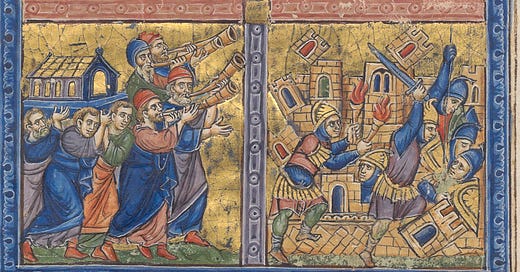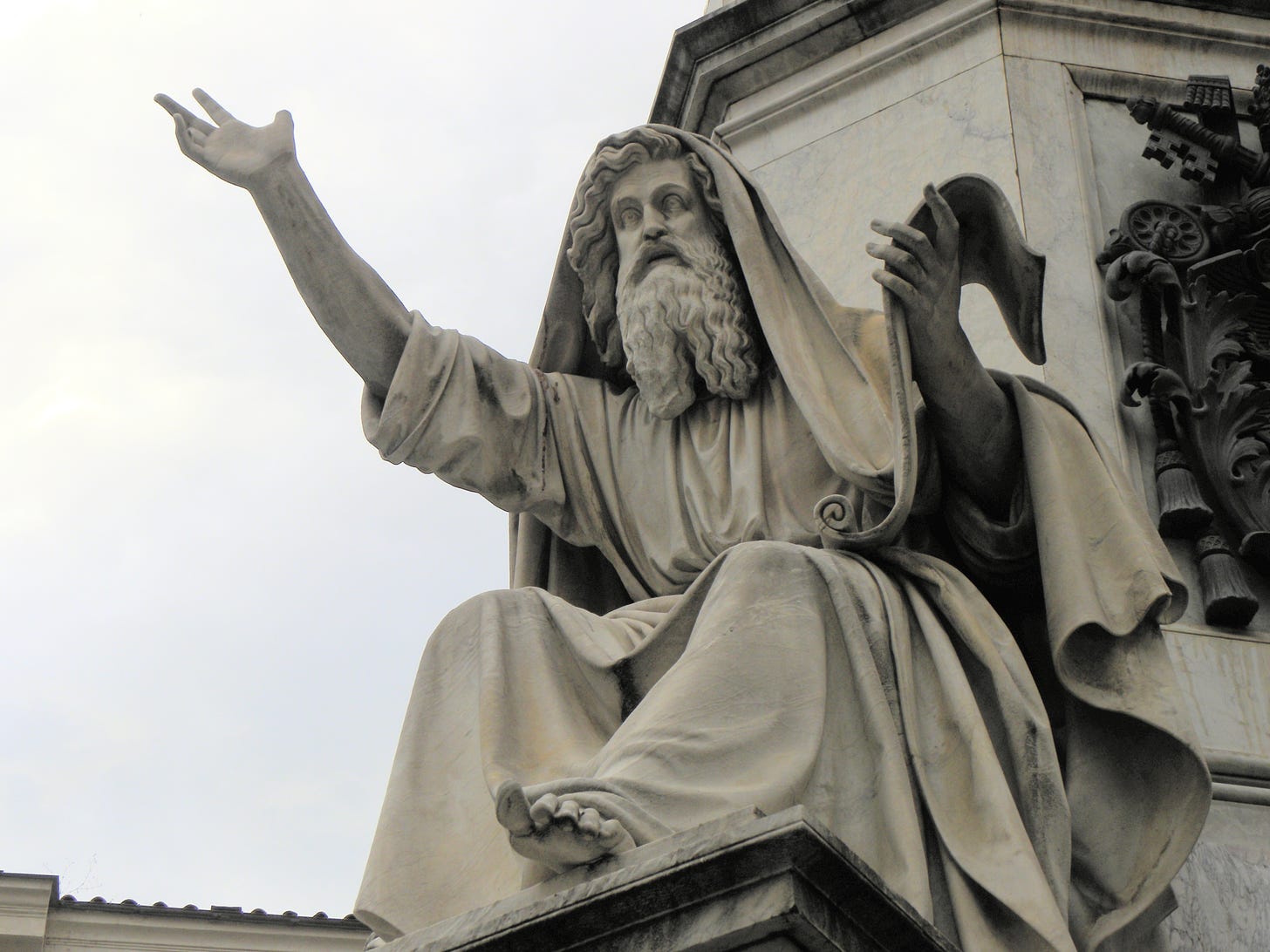In this past Thursday’s first reading from Scripture, the prophet Jeremiah declares:
Cursed is the man who trusts in human beings,
who seeks his strength in flesh,
whose heart turns away from the LORD. (17:5)
Jeremiah contrasts this person with one who places their trust in God:
Blessed is the man who trusts in the LORD,
whose hope is the LORD. (v. 7)
The language of the text suggests that the question of trust posed here is one meant to be grappled with in one’s heart and in one’s conduct, and in fact a few verses later Jeremiah mentions “those who acquire wealth unjustly” (v. 11) as an example of the sort of people who “trust in human beings.”
Jeremiah’s words, however, immediately follow a condemnation of the sin of Judah, the southern kingdom, “written with an iron stylus, engraved with a diamond point upon the tablets of their hearts” (v. 1), and warning that their enemies will lay waste to the kingdom. The question of trust posed by Jeremiah, then, is not just a matter of the individual heart, but also one of Israel’s covenant faithfulness.
This theme of the foolishness of putting “trust in human beings,” or in the works of human hands (particularly weapons), runs throughout the Hebrew Prophets. This foolishness is an obstacle to covenant faithfulness. It is also closely linked to the theme of the foolishness of trusting in idols (see Jer. 10:1-16). Isaiah in particular harshly condemns placing trust in idols:
They shall be turned back in utter shame
who trust in idols;
Who say to molten images,
“You are our gods.” (Isa:17)
This question of trusting in God or in human beings and their works should not be understood as a complete rejection of human agency, however. After all, in the biblical context, putting trust in God means being faithful to the covenant, including obedience to the commandments and care for the poor and marginalized. Rather, the question is whether the people trust in God’s providence, that God will be faithful to the covenant promises. Putting trust in human beings, then, means acting as if our ultimate well-being depends on our own power or cleverness rather than resting in God’s hands; as Jeremiah’s example of those who acquire money unjustly illustrates, this often involves twisting our morality and exploiting others to serve our own ends.
The theologian John Wood, in his book Perspectives on War in the Bible, argues that the authors of the Hebrew Bible do not share the later preoccupation of Christians about “just wars” or pacifism. Rather, the primary question in the Hebrew Bible is the one we have been looking at, the relationship between divine and human agency in the fulfillment of the covenant. Placing trust in military might or strategy leads to disaster:
Because you have trusted in your own power,
and in your many warriors,
The clamor of war shall break out among your people
and all your fortresses shall be ravaged. (Hos. 10:13-14)
Rather, the people of Israel must put their trust in God for protection. Wood points out, however, that this trust takes two forms. Most of the historical accounts reflect what he calls the “holy war: Israel active” perspective. In these accounts, the Israelites act as instruments or cooperative agents in carrying out God’s will by taking up arms against their enemies. God acts through the Israelites to fulfill the covenant, but ultimately it is God who is responsible.
In the later apocalyptic literature such as Daniel, but also in historical accounts like 2 Kings 19:9-37 (in which an angel destroys an Assyrian army encamped outside Jerusalem), in contrast, we see the “holy war: Israel passive” perspective, in which God intervenes to save Israel without the cooperation of the people. Wood persuasively argues that this perspective is also represented in the book of Revelation in the New Testament, where the Lamb defeats the Dragon and the Beast.
It is intriguing how closely this question of the relationship between divine and human agency in the fulfillment of the covenant with Israel parallels the later Christian debates over grace, particularly beginning with St. Augustine’s controversy with the Pelagians. Historically, Pelagianism has been defined as the belief that human works can merit salvation apart from the grace of God. Critics of Pelagianism, therefore, could easily link it to the biblical condemnation of trusting in human beings and their works (somewhat unfairly, since Pelagius believed the human capacities to do good were themselves gifts from God). Augustine, however, argued that we human beings depend on God’s grace for salvation; we must be transformed by God and be led to our salvation. Almost immediately, theologians turned to the question of whether and how human beings cooperate with God’s grace, a question that was a significant cause of, and that was intensified by, the Protestant Reformation. We can see variations of the “active” and “passive” perspectives in these debates.
Rather than diving into those debates, here I want to point out that, despite the uncanny similarities between the question of divine agency in the Hebrew Bible and the later Christian debates over grace, there is a significant difference. In the latter, the emphasis on divine agency in history has been diminished, if not completely lost, in favor of a focus on the interior transformation of the person. In the Hebrew Bible, prophets like Jeremiah called on the Israelites to trust that God was active in history and would fulfill the promises of the covenant through historical, socio-political events. In the Christian debates over grace, that social and historical context more often than not gets lost in favor of a focus on individual salvation.
This may be a modern problem that we read backwards into the Church Fathers and medieval scholastics. For them, grace was experienced through the sacraments, the communal, ritual practices of the New Covenant. And the sacraments, in a sense, form the Church, a social body that makes its way through history, its members attempting to faithfully live out their trust in God. So a nearly exclusive focus on individual salvation in discussions of divine and human agency may be less of an issue than it at first appears in earlier theology and more a product of modern individualism.
Further, the Peruvian theologian Gustavo Gutiérrez writes in A Theology of Liberation: History, Politics, and Salvation that, with the advent of the modern world,
the social praxis of contemporary humankind has begun to reach maturity. It is the behavior of a humankind ever more conscious of being an active subject of history, ever more articulate in the face of social injustice and of all repressive forces which stand in the way of its fulfillment; it is ever more determined to participate both in the transformation of social structures and in effective political action.
The modern development of the natural and human sciences reflects this desire to transform the earth and society through human agency. This trust that human activity can radically transform the world for the better is certainly a change from the worldview of the Church Fathers and scholastics that must be taken into consideration. It is also a worldview that makes it challenging to conceive how God could act in history to fulfill covenantal promises. For example, does it make sense to propose divine interventions or miracles that alter the course of history?
I think one way to understand liberation theology is as an attempt to wrestle with this question of divine and human agency, born from the struggles of the oppressed to overcome structures of injustice and their personal experience of a loving and just God. The Church’s official social teaching, particularly in the Second Vatican Council’s Gaudium et Spes and more recent papal encyclicals, has also attempted to balance attention to God’s providence over history and the role of human agency in transforming the world for the better.
Still, I think the question of what it means for us to trust in the Lord that his Kingdom is active in history rather than putting our trust in human beings and their works, but without downplaying our responsibility to engage in the work of social justice, is one we will continue to need to ponder. It was a question that captivated the Hebrew Prophets, and that should continue to captivate us today.







This is a wonderful analysis/reflection.
Have you considered writing reflections on lectionary readings that are coming up? I know many preachers that scour the web on Mondays, looking for insight for the following Sunday. If you got your posts up 2 weeks before the Sunday, I suspect you'll influence a few sermons out there.